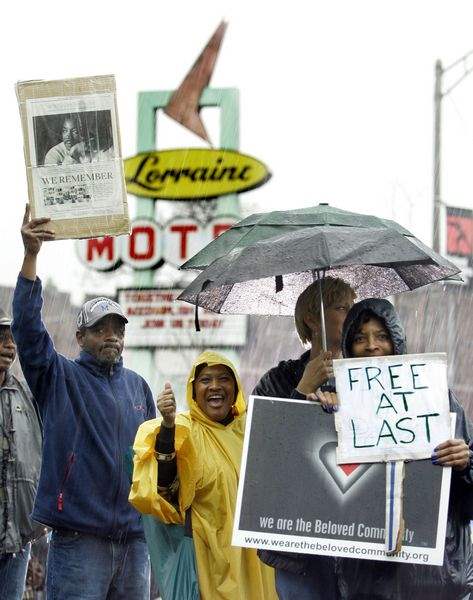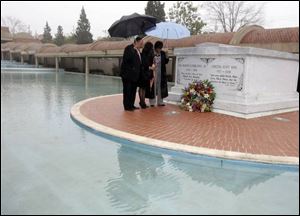
Throngs mark anniversary of King's death
4/5/2008
Outside of the Lorraine Motel, the site of Martin Luther King's assassination 40 years ago yesterday, marchers in the rain hold signs reflecting their thoughts, hopes, and prayers.
Mary Altaffer / AP

Martin Luther King III, left, his wife, Arndrea, and sister, the Rev. Bernice King, pray at Martin Luther King, Jr.'s tomb.
MEMPHIS - On the 40th anniversary of his assassination, the Rev. Martin Luther King, Jr., was remembered yesterday in the city where he died as a man who came to Memphis "to lead us to a better way."
Presidential candidates, civil rights leaders, labor activists, and thousands of citizens were coming together to honor Mr. King for his devotion to racial equality and economic justice.
In the background of those remembrances, more states are apologizing for their historic role in slavery in an effort to begin healing the wounds created by what many have called the country's "original sin."
Mr. King was cut down by a rifle slug on the balcony of the Lorraine Motel on April 4, 1968, while helping organize a strike by Memphis sanitation workers, then some of the poorest of the city's working poor.
Members of the American Federation of State, County, and Municipal Employees, which represented the workers then and now, marched in a steady rain yesterday from their downtown headquarters to the motel.
A line of several hundred people carrying umbrellas in a steady rain set off on the mile-long route.

Outside of the Lorraine Motel, the site of Martin Luther King's assassination 40 years ago yesterday, marchers in the rain hold signs reflecting their thoughts, hopes, and prayers.
"Dr. King was like Moses," said Leslie Moore, 61, a sanitation worker in 1968 who is still on the job. "God gave Moses the assignment to lead the children of Israel across the Red Sea. He sent Dr. King here to lead us to a better way."
Baxter Leach, 68, a retired sanitation worker, also took part in the strike, which marked the beginning of the end for white-only domination of government and civil affairs in Memphis. Before the strike, black sanitation workers labored long hours for little pay and could be fired at the whim of white bosses.
"We honor this day. We march," Mr. Leach said, adding that Mr. King helped all Americans. "He was for poor folks. He wasn't for just one color. He was for all colors."
Marchers packed the courtyard in front of the motel, now the National Civil Rights Museum, for a rally after their mile-long walk, standing shoulder to shoulder under a sea of multicolored umbrellas.
The museum also encompasses the flophouse across the street from which confessed killer James Earl Ray admitted firing the fatal shot. Ray died in prison in 1998.
Speakers urged the crowd to follow Mr. King's example by working to help the poor, improve public schools, and provide housing for the homeless.
Attending rallies isn't enough, said Dwight Montgomery, local director of the Southern Christian Leadership Conference, a national civil rights group Mr. King helped create.
"After the dust has settled, after the cameras are gone what will this crowd do?" Mr. Montgomery asked.
In Atlanta, Bernice King and Martin Luther King III placed a wreath at the national historic site where their father and mother, Coretta Scott King, are buried.
A special exhibit opened at the historic site chronicling the final days and hours before Mr. King's death, as well as his funeral procession through his hometown five days later.
In a statement, President Bush said that, in 1968, "America was robbed of one of history's most consequential advocates for equality and civil rights. We have made progress on Dr. King's dream, yet the struggle is not over."
Other tributes were being held around the country. In Congress, House and Senate leaders and lawmakers who once worked with the civil rights leader marked the anniversary with a tribute yesterday in the Capitol's Statuary Hall.
"Because of the leadership of this man we rose up out of fear and became willing to put our bodies on the line," said Rep. John Lewis (D., Ga.), a companion of Mr. King in the civil rights struggles of the 1960s.
In Indianapolis, Ethel Kennedy was scheduled to make brief remarks during a ceremony last night at what is now Martin Luther King, Jr., Park.
Her late husband, Robert Kennedy, gave a passionate speech there the night of Mr. King's assassination that was credited with quelling violence in the city.
On the issue of slavery, Florida last month became the sixth state to adopt a resolution expressing "profound regret for the shameful chapter" in the state's history and promoting "healing and reconciliation among all Floridians."
Alabama, Maryland, North Carolina, New Jersey, and Virginia have done so, and two other states - Nebraska and Missouri - are considering similar resolutions this year.
National black leaders applaud these gestures as an important step in reconciling the nation's long-standing racial differences, but caution that further actions, including reparations, are needed.
All six state resolutions passed with near unanimous approval, although debates that preceded passage focused on whether an official apology amounts to an admission of guilt that could lead to calls for reparations - payments to the descendants of slaves for their suffering and lost economic opportunities.
The same issue has stymied efforts at the federal level to issue a national apology.